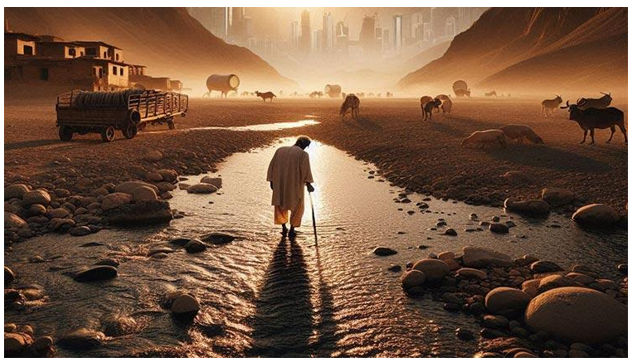INP-WealthPk
Muhammad Saleem

Without developing a comprehensive strategy for promoting water preservation, Pakistan is unlikely to prevent the climatic effects from hitting its agriculture. Dr Siddiqi, an expert in water resources, while talking to WealthPK, said the climate change was rapidly altering rainfall patterns in Pakistan. He said the situation would have serious implications for water availability in future. He warns that exacerbating water scarcity will affect the agriculture sector and cultivation patterns. “Our farmers are largely unaware of the fact that traditional cultivation methods are fast becoming obsolete. It is the prime responsibility of the agricultural scientists to train farmers in modern methods.” He urged scientists to introduce crop seeds that require minimal water. “Water scarcity is a decades-old issue for Pakistani farmers,” Siddiqi said, adding the situation is likely to deteriorate further.
He said waterlogging and salinity are posing serious threats to our land. “In the future, extreme weather events will become more frequent and severe. These events will place significant strain on our water infrastructure, making it difficult to manage,” he apprehended. He said prolonged dry spells are also depleting groundwater resources, creating issues for the domestic water supply and agricultural lands. Siddiqi said Pakistan is also facing a double-edged sword due to glacial melting. He explained that initially, it will increase river flows, subsequently causing floods. “However, it’s a matter of grave concern that long-term implications of glacial melting are alarming.” Elaborating further, he said following the decline in glaciers, river flow in Pakistan will drastically decrease, especially during dry seasons. “The situation will create water shortage for downstream communities solely relying on these rivers,” he added.
Dr Khan, a faculty member at the University of Agriculture, Faisalabad, told WealthPK that climate change is leading to flash floods in Pakistan, but the authorities are not adequately prepared to preserve this abundant water for agricultural use. He said water abundance should be viewed as a blessing for the agriculture sector, but policymakers are not taking the necessary steps to adapt to the changing climate. He warned that disrupted water availability due to climate change will lead to a shortage of food and damage the fertility of agricultural lands. He said that the gradual shift in rainfall patterns is a clear warning sign, but policymakers are not ready for what’s coming. To avoid impending water scarcity, Khan recommends constructing multiple dams in flood-prone cities to preserve rainwater for agricultural use. He believes this approach will help protect residents of the flood-prone localities and ensure water security for farmers.
He said without evolving climate adaptation strategies, particularly for agriculture, we would not be able to mitigate the devastating impact of climate change. Siddiqi, the expert in water resources, while talking about the rising temperatures and increased evaporation, said the combination will hit weather patterns and decline water availability. This, he warned, will ultimately lead to lower crop yields, endangering both humans and animals. As a developing country, he noted, we can not afford the consequences of such a situation. He said that the growing population, declining water availability, and impacts of climate change will hit urban areas, where water demand is increasing while supply is diminishing. Besides, he said water shortages would also create health problems as sanitation and poor water quality will become a source of waterborne diseases. “Pakistan immediately needs investments in rainwater harvesting, efficient irrigation technologies, and water conservation,” he underscored.
Credit: INP-WealthPk













